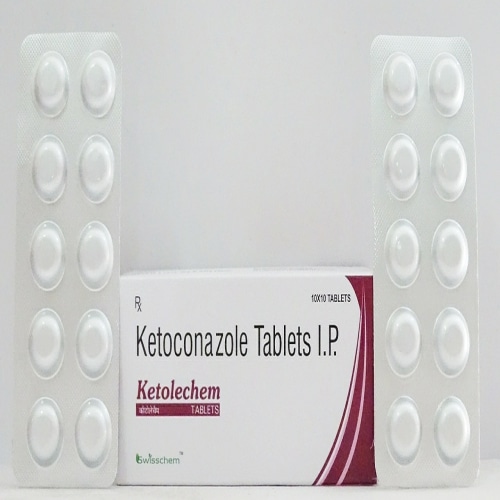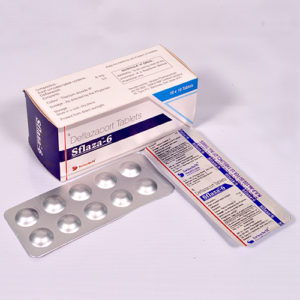Ketoconazole Tablets
Ketolechem
Ketoconazole tablets are a medication used to treat various fungal infections. Ketoconazole is classified as an azole antifungal medication. It works by inhibiting the growth and spread of fungal organisms by interfering with the production of ergosterol, a vital component of fungal cell membranes.
These tablets are typically prescribed for conditions such as:
Fungal skin infections: Ketoconazole tablets may be used to treat infections like tinea corporis (ringworm), tinea cruris (jock itch), tinea pedis (athlete’s foot), and pityriasis versicolor (a fungal infection that causes discolored patches on the skin).
Systemic fungal infections: In some cases, ketoconazole tablets may be used to treat internal fungal infections, such as candidiasis or systemic fungal infections caused by organisms like Histoplasma or Coccidioides.
How to use Ketoconazole Tablets
To use ketoconazole tablets:
- Take the prescribed dosage as directed by your healthcare provider.
- Follow the recommended timing instructions (with or without food) provided.
- Swallow the tablet whole with water.
- It is important to finish the entire prescribed treatment course.
- Avoid alcohol and medications that may interact with ketoconazole.
- Inform your doctor about any pre-existing medical conditions.
- Attend follow-up appointments as scheduled
Benefits of Ketoconazole Tablets
Ketoconazole tablets offer several potential benefits in the treatment of fungal infections. Here are some of the benefits associated with the use of ketoconazole tablets:
Effective Antifungal Treatment: Ketoconazole is an azole antifungal medication that is effective against a wide range of fungal organisms. It inhibits the growth and spread of fungal infections, helping to eliminate the causative organisms.
Treatment of Various Infections: Ketoconazole tablets can be used to treat various fungal infections, including skin infections like ringworm, jock itch, and athlete’s foot, as well as systemic fungal infections caused by organisms like Candida, Histoplasma, or Coccidioides.
Broad-Spectrum Activity: Ketoconazole exhibits broad-spectrum antifungal activity, meaning it can target multiple types of fungal organisms, making it a versatile treatment option for various infections.
The Convenience of Oral Administration: Ketoconazole tablets are taken orally, which provides convenience and ease of use compared to topical antifungal treatments that require frequent application.
Systemic Effect: As an oral medication, ketoconazole tablets can have a systemic effect, meaning they can reach and treat fungal infections in different parts of the body, including internal organs.
Side Effects of Ketoconazole Tablets
Ketoconazole tablets, like any medication, can potentially cause side effects in some individuals. Here are some common side effects associated with ketoconazole tablets:
Gastrointestinal Upset: This may include nausea, vomiting, abdominal pain, or diarrhea.
Skin Reactions: Some individuals may experience skin reactions such as rash, itching, or hives.
Headache and Dizziness: These side effects are less common but may occur in some cases.
Liver Function Abnormalities: Ketoconazole can affect liver function, leading to changes in liver enzyme levels.
Hormonal Effects: Ketoconazole may rarely affect hormone levels in the body, leading to potential side effects such as decreased testosterone levels or menstrual irregularities.
Allergic Reactions: In rare cases, allergic reactions to ketoconazole tablets may occur, characterized by symptoms like swelling, difficulty breathing, or severe skin reactions.
Precautions of Ketoconazole Tablets
When using ketoconazole tablets, it’s important to take certain precautions to ensure safe and effective use. Here are some precautions to consider:
- Consult with a doctor before starting ketoconazole tablets.
- Take the prescribed dosage as directed, and do not alter it without medical guidance.
- Inform your doctor about all medications you are taking to avoid potential interactions.
- Monitor liver function if you have a history of liver disease or are taking other medications affecting the liver.
- Discuss the use of ketoconazole tablets during pregnancy or breastfeeding with your healthcare provider.
- Avoid ketoconazole if you have a known allergy to it or similar antifungal medications.
- Attend follow-up appointments as scheduled for monitoring and addressing any concerns.





